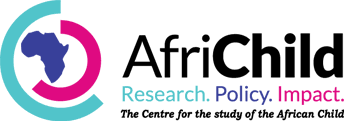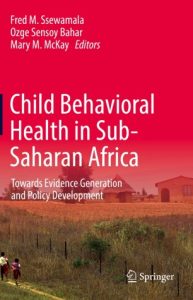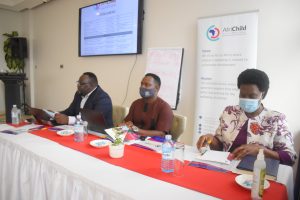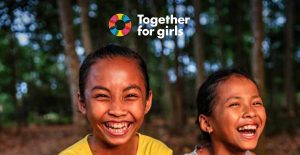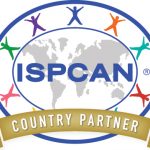In 2020, The AfriChild Centre in partnership with Together for Girls rolled out a research fellowship. This fellowship was designed to meet the dual purpose of enhancing both individual and institutional capacity to analyse and utilize VACS data. Founded in January 2013, the AfriChild Centre is a child focused research institution that generates research to inform policy and programming with a vision of, “An Africa where child wellbeing is realized for sustainable development.” The Centre is uniquely and strategically positioned to convene research, policy and practice by working with public entities, academia, private sector and civil society to generate research that informs policy and practice for the wellbeing of children.
The Uganda Research Fellowship is premised in the Uganda National Violence Against Children and Youth Survey (VACS) that was completed in 2018. The VACS is a country wide survey that systematically measures the prevalence, nature and consequences of sexual, physical and emotional violence. The survey targets children and young adults between 13-24 years. For ages 13-17 years, the survey explores the existing trends and recent exposure to violence against children while for those aged 18-24 years, data is collected to understand the lifetime exposure and consequences of violence.
The Uganda VACS was undertaken between 2015 and 2018 under the leadership of Ministry of Gender Labor and Social Development working with other partners including The AfriChild Centre, ChildFund International, Makerere School of Public Health, TPO Uganda, Uganda Bureau of Statistics (UBOS), U.S. Centers for Disease Control and Prevention (CDC) and UNICEF. A report of the findings was launched in August 2018 and findings were disseminated across the country and beyond the borders to various regional and international fora. The report revealed a very high prevalence of Violence against children making it a matter of urgency in order to improve children’s health and well-being. The survey provided the much needed evidence on the prevalence and context of VAC to better inform policy and programming. The Uganda VACS was the first ever, globally, to provide regional data which allows for targeted programme design and implementation.
The data has since led to targeted interventions and policy actions aimed at preventing and better responding to VAC in Uganda. Nevertheless, the richness of the data can never be exhausted, which warranted further analysis to generate more evidence to inform policy and programming to enhance the wellbeing of children. It was against this backdrop that the Uganda Research Fellowship, a partnership between Together for Girls and The AfriChild Centre, was initiated. While numerous interventions have been implemented for VAC prevention and response in Uganda over the years, the evidence from the VACS provides a basis for reflection, learning and rethinking the interventions in place in order to design more effective programmes.
Much as the data was collected in 2015, the Uganda VACS still presents a myriad of opportunities to inform policy and practice to improve the overall wellbeing of children in Uganda. The Uganda Research Fellowship was designed with the intention of catalyzing action by strengthening capacities at different levels to enable the country leverage the opportunities presented by the VACS data. This article highlights the achievements of the fellowship in terms of strengthening capacity to analyse and utilize VACS data in Uganda. The country, partly in response to the VACS, passed the National Child Policy in 2020, which among others highlights the importance of addressing VAC. The new Uganda National Development Plan III also emphasises the need to strengthen evidence based programming and policy making. This fellowship therefore serves as a springboard for more work with the VACS data as several aspects remain unexplored in the dataset.
The fellowship targeted two research fellows: Dr. Kenneth Olido, a Senior Lecturer at Gulu University, and Agatha Kafuko, a Lecturer at Makerere University. In order to institutionalise the learning, three AfriChild staff –Clare Ahabwe Bangirana, Mathew Amollo, and Maria Ndibalekera participated as well. The fellows underwent a training led by a CDC expert Dr. Ermias Amene, an Epidemiologist, with support from Manuela Balliet of Together for Girls and attained skills in secondary data analysis as well as developing and refining a research question using secondary data.
During the four months of virtual training, the participants were exposed to the VACS processes and questionnaires, and developing a data analysis plan. Each of the participants was tasked with developing a research question and conducting analysis for it. The ongoing analyses will result in peer reviewed publications in selected journals.

With the skills gained in the fellowship, the fellows set out to cascade these to other in-country researchers. In April 2021, AfriChild convened 15 in-country researchers/faculty members who were selected from six universities in Uganda; Makerere, Kyambogo, Gulu, Uganda Christian University, Uganda Martyrs and Nsamizi Institute for Social development. The faculty members were reoriented on VACS data with the purpose of encouraging them to appreciate secondary data analysis of VACS. The in-country researchers were presented with the VACS and had a chance to have a deeper understanding of the VACS data sets.
During the training, Timothy Opobo, the Executive Director of AfriChild, called for collaboration between AfriChild and the researchers to generate further research on child-focused topics. The platform gave some researchers who are pursuing their PhD in the area of Violence against Children an opportunity to interact with the VACS data set they had always wished to.

One participant described the three-day training thus,
“I have gained appreciation for the importance of secondary analysis of data. The facilitators were knowledgeable and worked with us well to make sure we understood. We were a very good number so all questions could be answered. I liked the presentation mode and the eloquence of the facilitator.”

A quick feedback survey conducted at the end of the training revealed that majority of the participants would like more trainings of this nature. There was consensus among participants on the value this training added to the discourse on utilizing VACS data in Uganda.
Training of policy makers and practitioners to utilize VACS data
In line with the core mandate of convening research, policy and practice, this fellowship presented an opportunity for AfriChild to contribute to the VAC policy and practice discourse by conducting training of policy makers and practitioners in August 2021. The training was aimed at promoting the deliberate utilization of VACS data at the national and regional levels by policy makers and programme implementers. The training was facilitated by Ms. Lydia Najjemba Wasula of Ministry of Gender Labor and Social Development and Ms. Stella Ayo Odongo from The African Partnership for Prevention of Violence Against Children (APEVAC), Timothy Opobo the Executive Director of AfriChild, and the Research Fellows.
The training brought together policy makers from the first cohort of one of AfriChild’s flagship programmes – The Policy Makers and Practitioners Utilizing Research Evidence (PPURE) programme that has been in place since 2018. This programme alongside another AfriChild programme, The Inter University Research Methods Program complete the cycle of strengthening both the supply side and the demand side of rigorous child focused research in Uganda.
While the PPURE programme strengthens in-country capacity to utilize research evidence, the inter-university research methods training programmes works with university faculty members from seven institutions of higher learning to strengthen in-country capacity to undertake rigorous child focused research. This fellowship provided an opportunity for AfriChild to consolidate the achievements of these two programmes by further harnessing these capacities in-country. The participants who represented both government and non-state entities across the fields of health, education and social protection appreciated the training, which enabled them to reflect on pertinent issues of VAC whose prevalence had enormously increased in this era of COVID as confirmed by a study by AfriChild “The effect of COVID-19 on the wellbeing of children in Uganda” and several administrative reports.

What the Research Fellows Say:
Dr. Kenneth Olido- Lecturer, Gulu University and Senior Research Fellow on the Uganda Research Fellowship

The fellowship commenced on the 1st September, 2020 with a training to develop an analytic plan for secondary data analysis for the Uganda VACS data. The training provided key insights on the VACS data, developing hypotheses, analytical strategies, selecting relevant indicators of interest from VACS data, preliminary analysis, and organizing references using open source bibliography software (Zotero).
During the fellowship, I have been privileged to learn how to reference using Zotero, develop problem indicators from complex large studies, and analyzing complex data using STATA. I worked closely with other researchers from AfriChild that helped me build more skills through team work. I have managed to produce one as first author. The paper has been reviewed by my mentor in the programme and peer reviewed by the other research fellows. The research fellowship has helped me identify my inadequacies in research particularly in areas of data analysis and research publication.
Agatha Kafuko, Lecturer, Makerere University & Research Fellow

Being a research fellow on this fellowship has been an exciting and rewarding experience. I appreciate the data analysis skills that I have received. Previously my knowledge of data analysis software was limited to SPSS. I have now learned how to use STATA, and I am excited about honing my STATA skills and using it for future work. The approach used for training was experiential, and ideal for the nature of work I was expected to do. The mentor support under this fellowship was also invaluable. The fellowship was unique and provided me with the opportunity to participate in training other researchers and policy makers. The interactions with professionals from diverse backgrounds has broadened by professional network. I am grateful for the flexible and participatory approach adopted by the AfriChild Centre in the management of this work. As a fellow, I felt valued because I had the opportunity to give feedback and participate in decision making. I am confident that with the skills I have obtained, I will be able to analyse data and provide evidence that can be used to make informed decisions for child wellbeing in Uganda. I look forward to a brighter future for children in Uganda. We can now use evidence to make a case for investment in children. We can only get better. Thank you AfriChild and Together for Girls for this opportunity.
Maria Ndibalekera- AfriChild Researcher participating in the Research Fellowship

The fellowship has been a whole new and enriching experience for me. I have gained a deeper understanding of VAC and its consequences, an opportunity to work closely with an amazing team and super growth in my career aspirations. Although this was not my first encounter with the findings and the report, having participated in the study Regional Dissemination Meetings in 2017, participating in the secondary analysis provided deeper insights on how enormous the consequences of violence go to affect every aspect of the survivor’s life. In this process, all hidden consequences of VACS were left bare as we ran different regressions with colleagues. The company of great Senior Researchers; our Lead Trainer Dr. Ermias Amene, Manuela Balliet, Dr. Kenneth Olido, Agatha Kafuko, Clare Ahabwe Bangirana and Mathew Amollo too made this journey memorable. Listening to their conceptualization and discussion of matters provided newer intuitions into my initial perspectives on VACS. This fellowship has inspired my career path. I dream of becoming a Social Work Action Researcher. Thank you, AfriChild, Thank you, Together for Girls!
Next Steps
AfriChild’s overarching goal is to contribute to investment for child wellbeing by providing policy makers and practitioners with excellent research evidence to inform policy actions and interventions. This fellowship has laid a solid foundation for the researchers to work independently.
Both the research fellows and the other researchers trained are now fired up to carry out further data analyses on their own in the future as well as empower other researchers and their students with these skills.
Bridging the gap of limited use of research evidence in policy making processes and in interventions targeting children remains at the core of AfriChild’s work. The Centre will continue to focus on promoting the increased use of research evidence in policy and practice working closely with policy makers and practitioners to provide timely and reliable evidence for decision making. The Centre will consolidate the gains from the research fellowship by continuing the discourse on the utilization of data, identifying entry points for VACS data utilization in policy processes and ultimately increasing access and use of evidence in policies that impact on child wellbeing specifically informing the response and prevention to VAC.
In addition to translating research evidence in formats that can be easily used by policy makers and practitioners, the Centre will build on the work started during this fellowship to continue strengthening in-country capacity to analyze and utilize research evidence for policy and practice through its flagship programmes- the Inter-University Child Focused Research Methods training and the Training of Policymakers and Practitioners on the Use of Research Evidence (PPURE).
Working with the research fellows and the policymakers and practitioners engaged throughout this fellowship, AfriChild will carry out targeted dissemination of sector specific findings and policy implications to contribute to enhanced evidence-based policy making, programming and practice across the relevant sectors.
